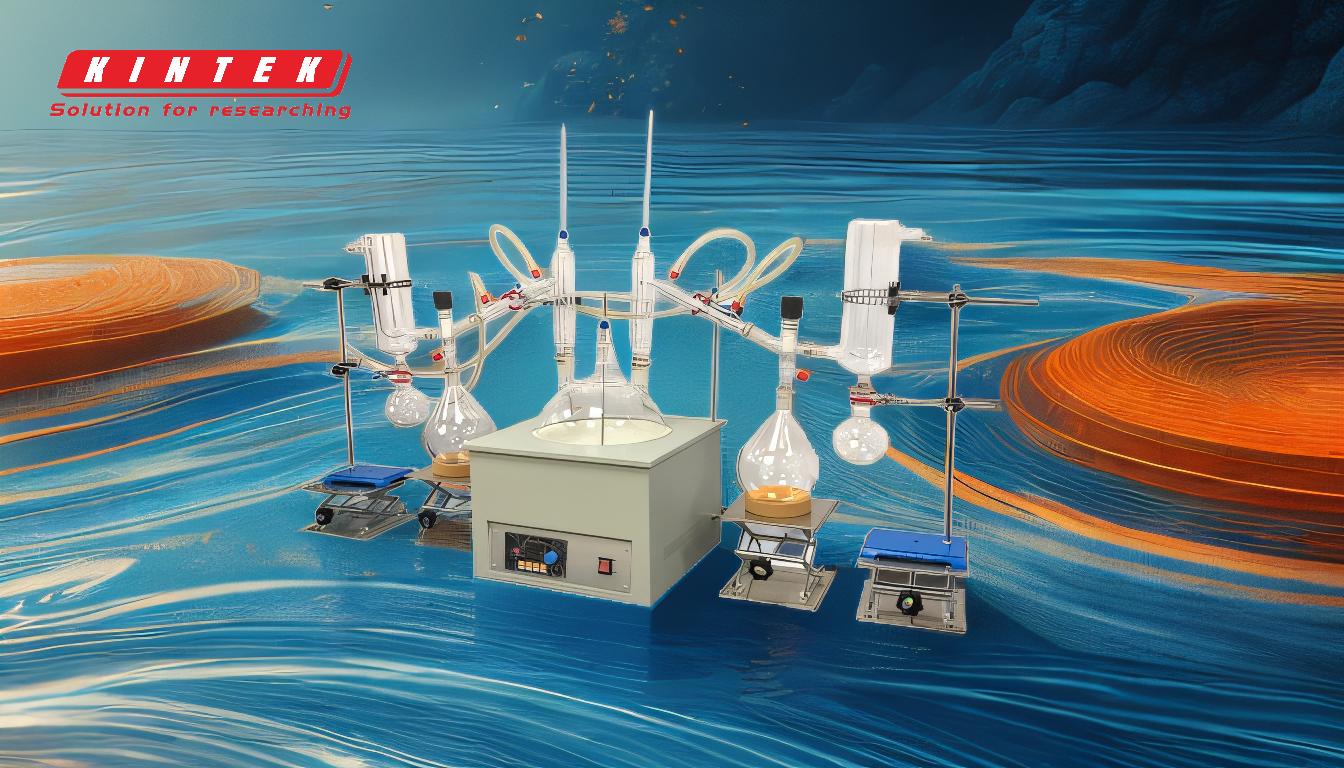Molecular distillation is a specialized separation technique used to purify and concentrate thermally sensitive materials, such as fish oil, by leveraging differences in the mean free path of molecules under high vacuum conditions. The process operates at low temperatures and pressures, ensuring minimal thermal degradation. It involves evaporating volatile molecules from a thin liquid film, allowing them to travel a short distance without collisions, and condensing them on a separate surface. This method effectively removes contaminants while preserving beneficial components like fatty acids. The process is widely used in industries requiring high-purity separation of compounds with low volatility and high boiling points.
Key Points Explained:

-
Principle of Molecular Distillation:
- Molecular distillation is based on the difference in the mean free path of molecules, which is the average distance a molecule travels before colliding with another molecule.
- Under high vacuum conditions, the mean free path of molecules increases, allowing lighter molecules to escape from the liquid surface and condense on a nearby surface, while heavier molecules return to the liquid phase.
- This separation occurs without boiling, as the process operates at temperatures below the boiling point of the materials, making it ideal for thermally sensitive compounds.
-
Process Conditions:
- High Vacuum: The process is conducted under extremely low pressure (high vacuum), which increases the mean free path of molecules and minimizes intermolecular collisions.
- Low Temperature: The use of low temperatures ensures that thermally unstable compounds, such as omega-3 fatty acids in fish oil, are not degraded during the process.
- Short Residence Time: The short time spent in the heating zone reduces the risk of thermal damage to sensitive materials.
-
Equipment and Mechanism:
- The distillation vessel is equipped with a heating jacket to maintain the required temperature.
- The feed material flows down the walls of the vessel and is spread into a thin film by PTFE wipers moving at high speeds (approximately 3 m/s), ensuring efficient heat transfer and evaporation.
- The evaporated molecules travel a short distance to a condenser, where they are collected as the purified product.
- The residue, which contains heavier molecules, is collected at the bottom of the vessel and can be recirculated for further distillation.
-
Advantages of Molecular Distillation:
- Preservation of Sensitive Compounds: The low-temperature operation preserves thermally unstable molecules, such as essential fatty acids, vitamins, and other bioactive compounds.
- High Purity: The process effectively removes contaminants, including heavy metals, pesticides, and other impurities, resulting in high-purity products.
- Efficiency: The design of molecular distillation systems, such as rotating film systems, ensures efficient separation with minimal energy consumption and heating time.
-
Applications:
- Food and Nutraceuticals: Used for the purification of fish oil, essential oils, and other bioactive compounds.
- Pharmaceuticals: Ideal for the separation and purification of thermally sensitive drug compounds.
- Chemical Industry: Applied in the separation of high molecular weight materials, such as polymers and resins.
-
Safety Considerations:
- The process involves handling flammable materials under high vacuum, which poses explosion risks. Therefore, careful handling and safety protocols are essential.
- Proper maintenance of equipment, including vacuum systems and condensers, is crucial to ensure safe and efficient operation.
-
Comparison with Other Distillation Methods:
- Unlike traditional distillation methods, molecular distillation does not rely on boiling. Instead, it uses the difference in mean free paths to separate compounds, making it suitable for materials that cannot withstand high temperatures.
- The process is more efficient for separating compounds with low volatility and high boiling points, which are difficult to purify using conventional methods.
In summary, molecular distillation is a highly effective and specialized technique for purifying and concentrating thermally sensitive materials. Its ability to operate at low temperatures and high vacuum conditions makes it indispensable in industries requiring high-purity separation of complex mixtures.
Summary Table:
| Aspect | Details |
|---|---|
| Principle | Separation based on differences in molecular mean free path under high vacuum. |
| Process Conditions | High vacuum, low temperature, short residence time. |
| Equipment | Heating jacket, PTFE wipers, condenser. |
| Advantages | Preserves sensitive compounds, high purity, efficient separation. |
| Applications | Food/nutraceuticals, pharmaceuticals, chemical industry. |
| Safety Considerations | Flammable materials under vacuum; requires careful handling. |
Discover how molecular distillation can benefit your industry—contact our experts today!










